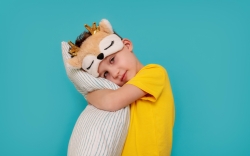5/1/24 blog post
how physical wellness connects to emotional wellbeing

in this article:
- 3 ways to prioritize physical wellness
- how to get moving
- tips for focusing on nutrition
- ways to promote healthy sleep habits
- more resources from On Our Sleeves
Have you ever noticed how certain events can shift the way you feel? That’s because our emotional health, mental health, and physical health are interconnected (research has validated). So when we give positive attention to one area, we can see a domino effect in another.
When our kids are in optimal health, they can better manage stress, sleep well, feel confident, and have more energy. When our physical health and mental health are balanced, we have emotional wellbeing.
Children's health experts at Children’s Hospital in Colorado say, “It’s well established that exercise and physical activity are crucial to a child’s development and overall health. But despite the many proven benefits of an active lifestyle on children’s physical, mental and emotional well-being, only one in four children in the U.S. is getting the recommended amount of physical activity each day.”
“Getting kids moving—no matter the time of year—is important now more than ever as rates of depression and anxiety in youth have surged.”
Get moving
Studies show that movement benefits our kids bodies and minds by:
- Improving mood and ability to focus
- Increasing positive classroom behavior and academic achievement for children
- Creating a stronger sense of self
- Increasing the ability to manage and adapt to stress
- Improving heart and brain health
In order to make movement a nourishing part of your lifestyle, you can focus on:
-
Making it fun! Dayton Children’s behavioral health and sports expert, Linh-Han Ikehara says, “We’re more likely to engage in movement when it makes us happy and creates connection with others!”
-
Find simple ways for getting movement in every day and including the whole family. Here are some suggestions:
- Go for a walk or bike ride. Bring the family dog if you have one!
- Have a hula hoop competition.
- Choose an animal and pretend to move like it. Try cheetah, elephant, and rabbit to start.
- Challenge the family to see if together you can do 50 jumping jacks!
-
Letting go of the idea you have to be perfect when trying! Remember that some movement is better than nothing at all. Shift the focus from checking exercise off of your to-do list to discovering how moving your body makes you feel. And, if your schedule becomes busy, be flexible and realize there are many options to get movement in each day.
Read more about the importance of moving to mental and physical health here.
focus on nutrition
When your body feels good, it is easier to make decisions that support your mental wellness. If you’re a parent or caregiver, you may find it challenging to give your children the best nutrition for their mental wellness while juggling busy schedules, food preferences and the independence of your child and teen. But it’s worth the work because studies show that:
-
Proper nutrition plays a significant role in brain development and function.
-
The nutrients in foods help build and maintain the brain's structure, affect mood and behavior, and support memory and learning.
Dayton Children’s nutrition expert, Emily Callen, says one easy way to target better nutrition for the mind and body is by focusing on sugar and caffeine intake.
“Generally, sugary beverages should be a once-in-a-while treat, and beverages that contain caffeine should be limited,” she explains.
The American Academy of Pediatrics recommends the following guidelines for daily caffeine intake:
- Under 12 years old: no caffeine
- 12-18 years old: no more than 100 mg of caffeine
- Under 12 years old: no more than 25 grams (6 teaspoons) of sugar a day
- 12-18 years old: no more than 25 grams (6 teaspoons) of sugar a day
Learn more about limiting sugar to age appropriate levels by clicking here.
promote healthy sleep habits
You probably already know that sleep impacts many aspects of a child’s life. In addition to mood, lack of sleep can cause problems such as:
- Reduced coping skills
- Acting out
- Feeling stressed or worried
So what can you do to help children get good sleep?
- Establish a schedule. That even means on weekends. It’s hard to give up sleeping in on weekends but having similar wake up and bedtimes every day helps. If you do get off schedule (due to illness, vacation, etc.), ease back into your regular schedule in 30-minute increments.
- Set a bedtime routine. Routines help create expectations. Even infants and young children will go to bed more easily if they’ve come to expect going to bed after things like a bath or story time. Avoid screens 30-60 minutes before bed; this can wake children up more than it relaxes them (even teens).
Get even more tips and resources on promoting healthy sleep habits by clicking here.
continue learning...
Continue on your emotional wellbeing journey by going to the next topic! Just click the button below.
understanding childhood stress
return to the emotional wellbeing learning hub
more resources from On Our Sleeves
If you're looking for access to even more resources to help you on your journey to supporting children's mental health, you'll want to become a part of the On Our Sleeves e-community! Our mission is to get our free, expert-created resources to as many caring adults in our communities so that everyone can understand and promote mental health for children.
Join us on this mission, by clicking the orange button below! You'll be signed up to start receiving monthly free content and resources to help you support the mental wellness of children in your life and break the stigma surrounding mental health. You'll also be the first to know about special giveaways like our Activity Book and Conversation Starter Cards.







